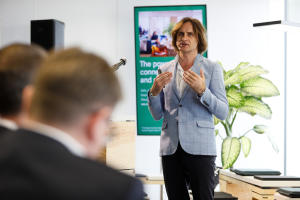Millennials now dominate the employment market so sociologist Tomasz Sobierajski, a lecturer at the University of Warsaw, gave a presentation on how this generation is different.
Firstly he described how the generations since 1946 are commonly divided up and then briefly discussed each one of them. The baby boomers (born in 1946-1964) are considered to be loyal employees, who often do not change jobs throughout their careers and now hold positions of power. However generation X (1965-1979) and the younger generations (including millennials – also known as generation Y – and the next generation, Z) definitely feel less attached to their employers. They will change jobs more frequently and require praise and reward for their achievements. He then went on to discuss the importance of happiness for millennials and generation Z. Younger employees expect integrated technology at every step, flexibility and as much teamwork as possible.
Tomasz Sobierajski drew attention to the importance of innovation in the workplace for younger employees as well as what he called a touch of nature including vertical gardens, and as much greenery in the office as possible. Millennials attach great importance to the design and furnishings of an office when making employment decisions. In comparison with baby boomers, who value private offices and a quiet place to concentrate, the younger generation prefers to work in open spaces. He also claimed that they appreciated places for additional activities in the office. Developers are increasingly adding yoga and training rooms to offices as well as areas to socialise in, such as large spacious kitchens.


“According to our research, three-quarters of millennials claim that the interior design affects their work, whereas only 39 pct of those from the older generation are of the same opinion,” he claimed. “Seven out of ten members of the younger generation believe that the external appearance of an office influences their professional decisions, whereas only four out of ten baby boomers would say the same thing,” were his concluding remarks.
 Polski
Polski






